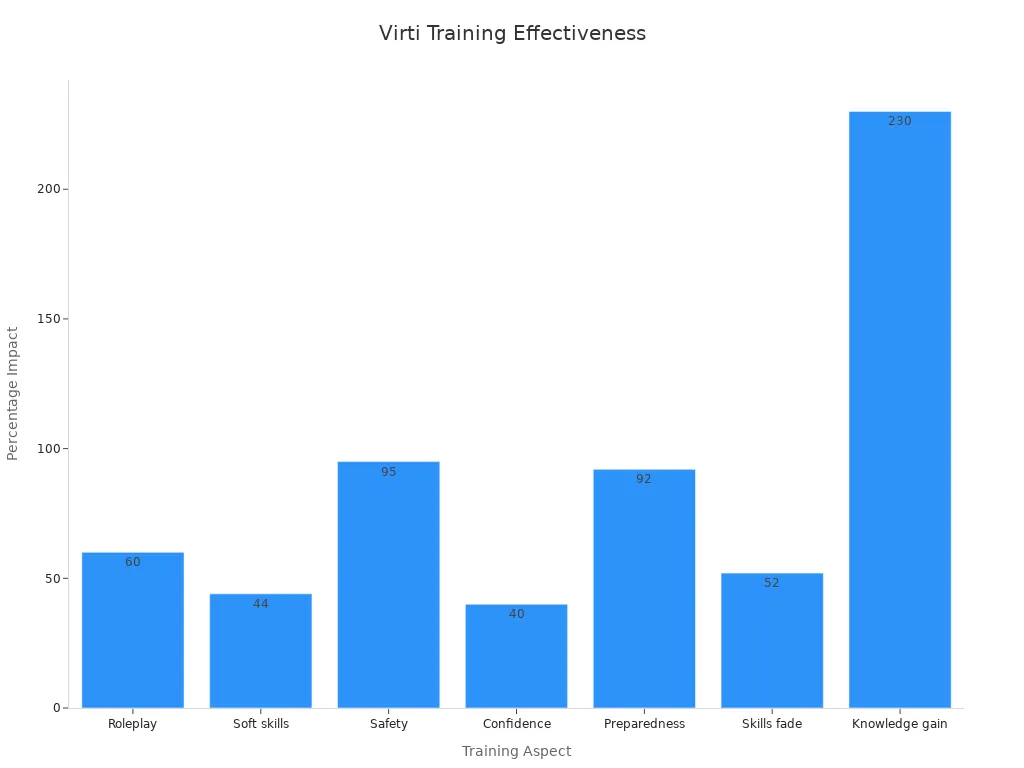Mastering AI Roleplay Online for Realistic Interactions
Discover platforms, features, and tips for AI roleplay online. Learn how to create lifelike interactions and enhance immersive experiences with adaptive AI.


AI roleplay online is becoming a favorite pastime for millions, and it’s easy to see why. Platforms like Character.AI report users spending an average of two hours daily, far surpassing engagement on traditional chatbots. With over 8.8 million downloads in just 12 days, it’s clear people are drawn to these lifelike interactions.
What makes it so fascinating? AI can now create characters that react in real-time, improvise, and even mimic human emotions. Whether it’s immersive experiences in gaming or realistic training simulations, AI transforms how you interact with virtual worlds. It’s not just roleplaying—it’s redefining imagination.
Understanding AI Roleplay
What is AI roleplay?
AI roleplay is a fascinating way to interact with artificial intelligence by creating and engaging with virtual characters in simulated scenarios. These characters can mimic human-like behaviors, respond to your inputs, and adapt to the context of the conversation. Think of it as stepping into a virtual world where you can practice conversations, explore imaginative storylines, or even simulate real-life situations.
One of the key components of AI roleplay is its ability to create immersive environments. For example, educators use AI roleplay to help students practice skills in realistic settings, such as a doctor-patient interaction. This approach emphasizes experiential learning, allowing you to engage in lifelike scenarios while receiving valuable feedback. Whether you're roleplaying for fun or skill development, AI makes the experience feel authentic and engaging.
The role of large language models in AI roleplay
Large language models (LLMs) are the backbone of AI roleplay. These advanced AI systems, like GPT, are trained on massive amounts of text data, enabling them to understand and generate human-like responses. They don’t just answer questions—they can improvise, adapt, and even simulate complex social behaviors.
Studies like MIRAGE have shown that LLMs excel in role-playing tasks that require cooperation, competition, and decision-making. This ability to mimic human-like behaviors is what makes AI roleplay so realistic. When you interact with an AI character, it feels like you're talking to a real person because the AI can perceive the environment, make decisions, and respond in a way that feels natural.
Scope and applications of AI roleplay in online interactions
The applications of AI roleplay online are vast and growing. You can use it for entertainment, education, or even professional training. Platforms like Character.AI let you create custom characters for storytelling or gaming, while others focus on skill development through simulated conversations.
For instance, AI roleplay applications are transforming industries like healthcare and customer service. Imagine practicing a difficult conversation with an AI that provides real-time feedback or simulating a high-stakes negotiation to improve your skills. These scenarios are not just about fun—they're about learning and growth.
AI roleplay online also opens doors to creative exploration. You can craft unique narratives, experiment with different personalities, or even build entire virtual worlds. The possibilities are endless, and the technology continues to evolve, making interactions more lifelike and engaging.
Top Platforms for AI Roleplay Online

When it comes to exploring the world of AI roleplay online, choosing the right platform can make all the difference. Each platform offers unique features tailored to different needs, whether you're looking for creative storytelling, immersive training, or real-time adaptability. Let’s dive into three standout platforms that are shaping the future of roleplaying experiences.
Character.AI: A platform for creating and interacting with custom AI characters
Character.AI is a powerhouse for creativity. It allows you to design and interact with custom AI characters that feel alive. Whether you want to create a quirky sidekick for a story or a mentor for skill-building, this platform has you covered.
Here’s what makes Character.AI so popular:
- Over 20 million active users worldwide engage with the platform.
- Users have created approximately 18 million unique chatbots, showcasing the endless possibilities for customization.
- The app has achieved 10 million downloads on the Google Play Store, reflecting its widespread appeal.
What sets Character.AI apart is its focus on personalization. You can tweak your characters’ personalities, traits, and even their conversational style. This level of customization ensures that every interaction feels unique and engaging. Whether you're crafting a fantasy world or simulating real-life scenarios, Character.AI makes roleplaying more immersive than ever.
Virti: Immersive training experiences through AI roleplay
Virti takes roleplaying to the next level by focusing on professional and educational applications. It uses AI and virtual reality (VR) to create lifelike training environments where you can practice real-world scenarios safely.
Here’s a quick look at how Virti performs:
| Statistic | Value | Description |
|---|---|---|
| 60% | of learners found Virti more effective for role play scenarios than face-to-face training. | |
| 44% | of learners score higher on soft skills assessments after completing a VR module. | |
| 95% | of learners feel safer on the job after completing XR simulated training. | |
| 40% | of learners in VR are more confident than learners in traditional training methods. | |
| 92% | of learners feel better prepared to approach a real-life scenario following VR training. | |
| 52% | reduction in skills fade. | |
| 230% | increase in knowledge gain from using VR. |

Virti’s strength lies in its ability to provide a safe, judgment-free environment for practicing conversations. Whether you're preparing for a high-stakes negotiation or learning how to handle customer complaints, the platform offers AI-driven feedback to help you improve. Plus, it’s accessible anytime, anywhere, making it a flexible option for consistent training.
Convai: Real-time adaptive environments for enhanced immersion
Convai is all about adaptability. This platform specializes in creating real-time, dynamic environments where AI characters respond to your actions and decisions. It’s perfect for gamers, storytellers, and anyone looking to push the boundaries of interactive roleplaying.
Convai’s standout feature is its ability to integrate with existing virtual worlds. Imagine walking through a medieval village where every character you meet has a unique personality and reacts differently based on your choices. This level of immersion makes Convai a favorite among creators who want to build rich, interactive experiences.
The platform also excels in conversational depth. Its AI characters can hold meaningful, context-aware conversations, making every interaction feel authentic. Whether you're exploring a fantasy realm or simulating a business meeting, Convai ensures that the experience is both engaging and realistic.
SkillGym: Simulating realistic conversations for skill development.
SkillGym is a game-changer when it comes to building conversational skills. It’s designed to help you practice real-life interactions in a safe, controlled environment. Whether you’re preparing for a job interview, learning to handle tough conversations, or improving your leadership communication, SkillGym offers a hands-on approach to skill development.
What makes SkillGym stand out is its focus on measurable growth. The platform tracks key metrics during your sessions to give you a clear picture of your progress. Here’s a quick breakdown of what SkillGym evaluates:
| Metric | Description |
|---|---|
| Confidence | Tracks how self-assured you feel during conversations. |
| Self-Awareness | Measures how well you understand your own behavior and its impact on others. |
| Self-Control | Evaluates your ability to manage emotions and reactions during interactions. |
| Learning Agility | Assesses how quickly you adapt and learn from different conversational scenarios. |
SkillGym doesn’t just stop at tracking metrics. It also helps you analyze your performance across different stages of a conversation. For example, you can see how your tone or word choice early in a discussion affects the outcome later. This kind of insight is invaluable for improving your communication skills.
The platform uses a competency model to score observable behaviors. This means you’ll get detailed feedback on specific actions, like how well you maintained eye contact or managed pauses. By understanding these details, you can fine-tune your approach and see noticeable improvements over time.
If you’re serious about mastering conversations, SkillGym is a tool worth exploring. It’s not just about practicing—it’s about growing and becoming more confident in every interaction.
Comparing platforms for different user needs.
Choosing the right platform for AI roleplaying depends on what you’re looking for. Some platforms excel in creativity, while others focus on emotional intelligence or professional training. Let’s compare a few popular options to help you decide:
| Platform | Key Features | Strengths | Limitations |
|---|---|---|---|
| CharacterAI | Advanced personality modeling, multi-genre interaction, user-generated character creation | Highly adaptive AI, extensive character library, intuitive interface | Occasional contextual drift, premium features require subscription |
| Replika | Deep emotional learning algorithms, mental health support features | Genuine companionship, emotional support | Focused on emotional intelligence, may not suit all users |
| NovelAI | Genre-specific narrative generation, collaborative storytelling modes | Ideal for creative professionals, advanced plot development | May not cater to casual users or non-writers |
If you’re into storytelling or gaming, CharacterAI might be your best bet. It lets you create unique characters and explore imaginative worlds. On the other hand, Replika is perfect if you’re looking for emotional support or companionship. It’s like having a virtual friend who understands you. For writers and creative professionals, NovelAI offers tools to craft detailed narratives and collaborate on stories.
Each platform has its strengths and weaknesses, so think about your goals before diving in. Whether you want to improve your skills, explore creative ideas, or just have fun, there’s a platform tailored to your needs.
Features That Enhance Immersive Roleplaying Experiences

Natural language processing and conversational depth
Natural language processing (NLP) is the magic behind lifelike conversations in AI roleplay online. It’s what makes AI characters feel like they truly understand you. With advanced NLP techniques, AI can analyze the context of your words, pick up on emotional cues, and respond in ways that feel natural.
Here’s why NLP matters:
- It improves interactions with AI characters in games and simulations.
- It enables dynamic storytelling that adapts to your choices.
- It creates personalized gaming experiences by tailoring conversations to your emotions.
Imagine playing a game where every non-player character (NPC) reacts differently based on your mood or decisions. That’s the power of NLP. It doesn’t just make conversations engaging—it makes them unforgettable.
Customization options for characters and scenarios
Customization is where AI roleplaying truly shines. You get to shape the world and characters to fit your imagination. Want a wise mentor for your story? Or maybe a mischievous sidekick? You can tweak personalities, dialogue styles, and even physical traits to match your vision.
Platforms like Character.AI make this process simple. You can adjust everything from a character’s tone to their backstory. Plus, you can create scenarios that feel unique to you. Whether you’re crafting a medieval adventure or simulating a business meeting, customization lets you take control of the experience.
Tip: Start small when customizing. Focus on one or two traits first, then expand as you get comfortable. This way, you won’t feel overwhelmed by the options.
Integration of multimedia elements for realism
Multimedia elements add a whole new layer of immersion to AI roleplaying. Visuals, sound effects, and even animations can make your interactions feel more lifelike. For example, imagine a virtual world where you hear the rustling of leaves as you walk through a forest or see a character’s facial expressions change as they talk.
These elements aren’t just for show—they enhance the realism of your experiences. Platforms like Convai use multimedia to create adaptive environments that respond to your actions. This makes every moment feel dynamic and engaging.
Note: Multimedia integration isn’t just for gaming. It’s also used in professional applications like training simulations, where realistic visuals and sounds help you prepare for real-world scenarios.
Adaptive AI responses and emotional intelligence.
Have you ever felt like an AI character truly understood you? That’s the magic of adaptive AI responses and emotional intelligence. These features make roleplaying feel more human by allowing AI to adjust its behavior based on your emotions and actions. It’s like having a conversation with someone who really gets you.
Adaptive AI doesn’t just follow a script. It learns from your interactions and tailors its responses to fit the situation. For example, if you’re roleplaying in a tense negotiation, the AI might pick up on your tone and respond with calm, reassuring words. This creates a dynamic experience where every choice you make shapes the outcome.
Emotional intelligence takes things even further. AI can now recognize emotional cues like frustration, excitement, or sadness. Imagine playing a game where your character’s mood influences how others react. This level of realism makes personalized gaming experiences unforgettable. It’s not just about the words the AI uses—it’s about how it makes you feel.
These advancements have practical applications too. In training simulations, emotionally intelligent AI can help you practice handling difficult conversations. It provides feedback on how your tone or word choice affects the interaction. This helps you improve your communication skills in a safe, judgment-free environment.
The best part? Adaptive AI and emotional intelligence foster a sense of community. Whether you’re gaming, learning, or exploring creative stories, these features make every interaction feel meaningful. They transform AI roleplaying into something truly immersive and personal.
Tip: Pay attention to how AI characters respond to your emotions. It’s a great way to see how far this technology has come!
Best Practices for Realistic AI Roleplay Interactions
Tips for customizing AI characters and settings
Customizing AI characters is where the magic of roleplaying begins. You can shape their personalities, dialogue styles, and even their backstories to fit your vision. Start by thinking about the role your character will play. Is it a wise mentor, a mischievous sidekick, or an intelligent NPC in a medieval village? Once you decide, tweak their traits to match the role.
Platforms like Character.AI make this process simple. You can adjust everything from tone to conversational depth. For example, if you're creating a character for adaptive storytelling, focus on traits that make them dynamic and responsive. This ensures they react naturally to your choices, making the experience more immersive.
When customizing settings, keep the context authentic. If you're simulating a business meeting, include realistic scenarios like negotiations or compliance discussions. Financial institutions often use AI roleplay to train employees on handling sensitive information. Tech support centers rely on simulations to troubleshoot technical problems. These tailored settings make the roleplaying feel lifelike and relevant.
Tip: Start small. Focus on one or two traits or settings first, then expand as you get comfortable. This keeps the process manageable and fun.
Strategies for maintaining engagement during roleplay
Keeping engagement high during roleplay is all about interaction. Make sure your AI characters feel alive and responsive. Use adaptive storytelling techniques to create narratives that evolve based on your choices. For example, intelligent NPCs in games can react differently depending on your mood or actions. This keeps the experience fresh and exciting.
Another way to maintain engagement is by setting clear objectives. Whether you're roleplaying for fun or skill development, having a goal keeps you focused. For instance, employees practicing negotiation skills can engage in real-world scenarios, make decisions, and receive instant feedback. This interactive approach boosts learning while keeping the experience enjoyable.
Finally, don’t forget to mix things up. Add multimedia elements like visuals or sound effects to make the environment more immersive. Imagine hearing the rustling of leaves as you walk through a forest or seeing a character’s facial expressions change during a conversation. These details enhance engagement and make the roleplaying feel more real.
How to provide effective prompts for lifelike responses
Effective prompts are the key to unlocking lifelike AI responses. When crafting prompts, be specific and clear. Instead of asking, “What’s your opinion on this?” try something like, “How would you handle a disagreement in a team meeting?” This gives the AI more context to generate meaningful replies.
Keep your prompts relevant to the scenario. If you're roleplaying in a fantasy world, include details about the setting or characters. For example, “You’re a knight tasked with protecting the village from invaders. How do you prepare for the battle?” This helps the AI create responses that fit the narrative.
Interactive prompts also improve engagement. Ask questions that encourage the AI to adapt and improvise. For instance, “What’s your plan if the negotiation takes an unexpected turn?” This pushes the AI to think dynamically, making the interaction feel more human.
Note: Providing clear learning objectives and fair evaluation criteria ensures the AI stays focused on delivering authentic and relevant content.
Balancing creativity and realism in roleplay scenarios.
Striking the right balance between creativity and realism in AI roleplay can transform your experiences into something truly memorable. You want your narratives to feel imaginative yet believable, so they resonate with you and the community you’re engaging with.
Start by focusing on the story’s foundation. Think about the setting, characters, and objectives. If you’re crafting a medieval adventure, include intelligent NPCs that react to your choices. These characters should have personalities and motivations that make sense within the world. For example, a village elder might offer wisdom, while a mischievous thief could challenge your decisions. This mix of realism and creativity keeps the engagement high.
Adaptive storytelling is another powerful tool. It allows your narratives to evolve based on your actions. Imagine a scenario where your choices shape the outcome of a quest. If you choose diplomacy over combat, the NPCs might respond with gratitude instead of fear. This dynamic approach makes the story feel alive and personal.
Don’t forget to add creative twists. Introduce unexpected elements that surprise and delight. Maybe the wise mentor turns out to be the villain, or the forest you’re exploring hides a secret portal. These surprises keep the experience fresh while maintaining a sense of realism.
Tip: Test your scenarios with friends or online communities. Their feedback can help you refine the balance between creativity and realism.
Finally, remember that realism doesn’t mean boring. It’s about grounding your story in details that make it believable. Use sensory descriptions, logical character behaviors, and consistent rules for your world. When realism supports creativity, your roleplay becomes immersive and unforgettable.
Mastering AI roleplay starts with choosing platforms and features that align with your goals. Whether you're exploring creative storytelling or honing professional skills, the right tools make all the difference. Customization, adaptive AI, and emotional intelligence are key to creating lifelike experiences that feel personal and engaging.
Looking ahead, AI roleplay is set to evolve even further. Models driven by long-term memory (LTM) and frameworks like the thespian agent system are already enhancing adaptability and reducing costs. Here's a glimpse into the future:
| Evidence Description | Key Findings |
|---|---|
| Human role-playing paradigm | Effective in producing high-quality datasets for AI interactions. |
| Thespian agent framework | Facilitates diverse interaction data through multi-character simulation. |
| LTM-driven model evolution | Models can evolve through both real and virtual interactions, enhancing capabilities. |
The possibilities are endless. As AI roleplay grows, it will redefine how you interact, learn, and create in virtual spaces.
FAQ
What is the best platform for beginners in AI roleplay?
If you’re just starting, Character.AI is a great choice. It’s user-friendly and offers plenty of customization options. You can create characters, explore scenarios, and learn the basics of AI roleplay without feeling overwhelmed.
Tip: Start with pre-made characters to get a feel for the platform before creating your own.
Can I use AI roleplay for professional skill development?
Absolutely! Platforms like SkillGym and Virti are designed for this purpose. They simulate real-world scenarios, helping you practice communication, negotiation, or leadership skills. These tools provide feedback to help you improve in a safe, judgment-free environment.
Example: Use SkillGym to prepare for job interviews or tough workplace conversations.
How do I make AI characters feel more realistic?
Focus on providing detailed prompts and customizing their traits. For example, describe their personality, goals, and backstory. Platforms like Character.AI let you tweak these settings easily. The more specific you are, the more lifelike the interactions will feel.
Pro Tip: Experiment with different dialogue styles to see how the AI adapts.
Are there any free platforms for AI roleplay?
Yes, many platforms offer free versions. Character.AI and Replika have free tiers with basic features. However, premium plans unlock advanced options like deeper customization and enhanced conversational depth.
Note: Free versions are great for casual users, but professionals may benefit from premium features.
Can AI roleplay help with creative writing?
Definitely! Platforms like NovelAI are perfect for writers. They assist with brainstorming, character development, and storytelling. You can collaborate with the AI to craft unique narratives or overcome writer’s block.
Fun Fact: Many authors use AI tools to explore new plot ideas and refine their stories.
See Also
Exploring Unfiltered AI Roleplay That Ignites Creativity
Discovering Top NSFW AI Platforms for Engaging Roleplay
Ten Leading NSFW AI Chat Applications Competing with Character AI
Creating Your First AI Girlfriend Video: A Beginner's Guide
Your Comprehensive 2025 Handbook for Free Online AI Girlfriends